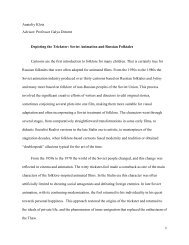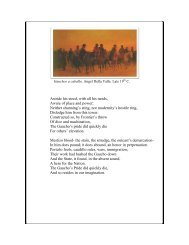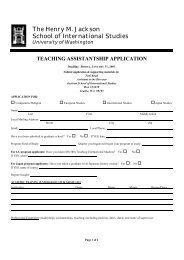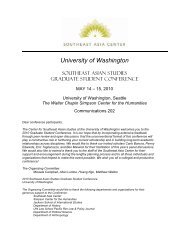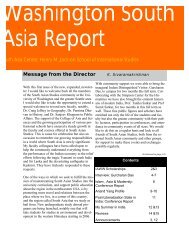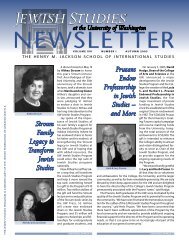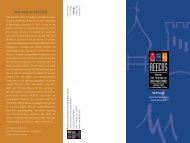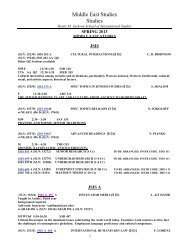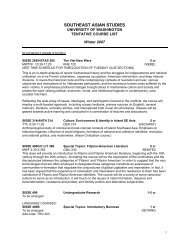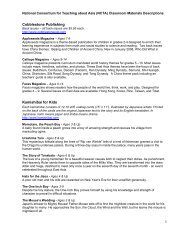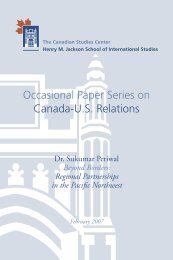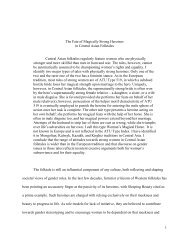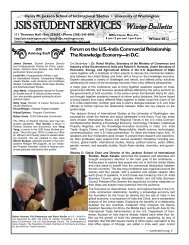jewish studies jewish studies - Jackson School of International ...
jewish studies jewish studies - Jackson School of International ...
jewish studies jewish studies - Jackson School of International ...
You also want an ePaper? Increase the reach of your titles
YUMPU automatically turns print PDFs into web optimized ePapers that Google loves.
Photo courtesy Koret Institute<br />
Photograph by Kathy Sauber, © University Photography<br />
6<br />
THE 2003 SAMUEL & ALTHEA STROUM LECTURESHIP IN JEWISH STUDIES<br />
“Jewish Renewal and<br />
the American Spiritual<br />
Marketplace”: a summary<br />
This year, Chava Weissler, the Philip<br />
and Muriel Berman Pr<strong>of</strong>essor <strong>of</strong> Jewish<br />
civilization in the department <strong>of</strong> Religion<br />
Studies at Lehigh University, presented<br />
the Samuel and Althea Stroum Lectures.<br />
Her subject was “Jewish Renewal and<br />
Chava Weissler the American Spiritual Marketplace.”<br />
Weissler’s research on Jewish Renewal<br />
emerged from her book about seventeenth- and eighteenthcentury<br />
Yiddish devotional prayers, Voices <strong>of</strong> the Matriarchs:<br />
Listening to the Prayers <strong>of</strong> Early Modern Jewish Women (Boston:<br />
Beacon Press, 1998). These prayers were part <strong>of</strong> a mystical<br />
revival in Judaism in which kabbalah became central for a large<br />
mass <strong>of</strong> Jewish people, both men and women, for the first<br />
Chava Weissler, Rochelle Roseman and Althea Stroum<br />
share greetings during the reception after the lecture.<br />
time in history. After completing this book, Weissler turned to<br />
the popularization <strong>of</strong> kabbalah in contemporary American religion<br />
and set out to understand its appeal for Jews today,<br />
women in particular. For the purposes <strong>of</strong> fieldwork, Weissler<br />
looked for a community that sought to make the esoteric teachings<br />
<strong>of</strong> kabbalah broadly available to anyone interested. She<br />
landed upon the Jewish Renewal movement, which draws upon<br />
kabbalah as one <strong>of</strong> its sources and regards women and men as<br />
equal partners in Jewish life. Her main focus was Aleph: The<br />
Alliance for Jewish Renewal, a network <strong>of</strong> groups with roots in<br />
neo-Hasidism, 1960s counterculture, the ecological and feminist<br />
movements, and eastern philosophies.<br />
Aleph describes itself as trans-denominational, seeking to<br />
infuse the established four denominations (Reform,<br />
Reconstructionist, Conservative, and Orthodox) with an experiential<br />
relationship with the sacred. Rabbis associated with<br />
Renewal have been ordained by each <strong>of</strong> these four movements.<br />
But, Weissler argued in her first lecture, sociologically Renewal<br />
looks like a denomination. To explain this, she invoked the<br />
sociologist <strong>of</strong> religion Wade Clark Ro<strong>of</strong>, who describes an American<br />
“spiritual marketplace” in which the texts <strong>of</strong> nearly every<br />
religious tradition are widely accessible in book shops in English<br />
translations. ”We live in a commodity culture,” Weissler<br />
explained, “and consumption is our main means <strong>of</strong> selfexpression.”<br />
␣ And yet this is paradoxical since spirituality and<br />
consumerism might also be seen as opposed. But Renewal fulfills<br />
market demands for a certain type <strong>of</strong> Judaism, she argued,<br />
and in that sense, the structure <strong>of</strong> the American marketplace<br />
has converted a “trans-denominational” spiritual movement<br />
into one that behaves institutionally like a denomination.<br />
Weissler went on to outline seven characteristic features <strong>of</strong><br />
Renewal: the quest for an experiential relationship with God;<br />
a commitment to gender equality; an approach to Jewish traditions<br />
(particularly hasidic and mystical ones) as resources<br />
rather than inflexible obligations; openness to the spiritual<br />
resources <strong>of</strong> other religious traditions; reliance upon charismatic<br />
leadership, in which the rabbi is a vehicle for closeness to God<br />
CONTINUED ON PAGE 2<br />
Photograph by Kathy Sauber, © University Photography



